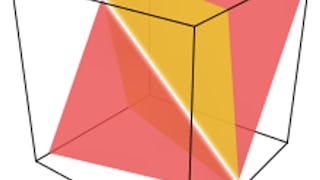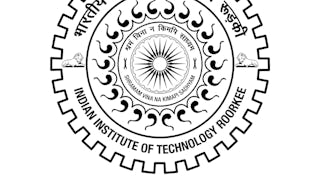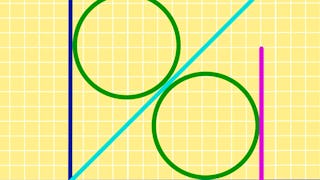This is the first course of a three course specialization that introduces the students to the concepts of linear algebra, one of the most important and basic areas of mathematics, with many real-life applications. This foundational material provides both theory and applications for topics in



Linear Algebra: Linear Systems and Matrix Equations
Ce cours fait partie de Spécialisation Linear Algebra from Elementary to Advanced

Instructeur : Joseph W. Cutrone, PhD
Enseignant de premier plan
9 828 déjà inscrits
Inclus avec 
(120 avis)
Expérience recommandée
Détails à connaître

Ajouter à votre profil LinkedIn
11 devoirs
Découvrez comment les employés des entreprises prestigieuses maîtrisent des compétences recherchées

Élaborez votre expertise du sujet
- Apprenez de nouveaux concepts auprès d'experts du secteur
- Acquérez une compréhension de base d'un sujet ou d'un outil
- Développez des compétences professionnelles avec des projets pratiques
- Obtenez un certificat professionnel partageable


Obtenez un certificat professionnel
Ajoutez cette qualification à votre profil LinkedIn ou à votre CV
Partagez-le sur les réseaux sociaux et dans votre évaluation de performance

Il y a 4 modules dans ce cours
In this module we introduce two fundamental objects of study: linear systems and the matrices that model them. We ask two fundamental questions about linear systems, specifically, does a solution exist and if there is a solution, is it unique. To answer these questions, a fundamental invariant needs to be found. We will use the Row Reduction Algorithm Algorithm to see the number of pivot positions in a matrix. These foundational concepts of matrices and row reduction will be revisited over and over again throughout the course so pay attention to new vocabulary, the technical skills presented, and the theory of why these algorithms are performed.
Inclus
2 vidéos2 lectures3 devoirs
In this section we temporarily leave our discussion of linear systems to discuss vectors. These nx1 matrices are used in many contexts in physics, computer science and data science. We show in this section that answering questions about linear combinations turns out to be equivalent to solving a system of linear equations, underlying the deep connections of linear algebra. We then introduce the notion of a matrix as a function on vectors. Questions now about properties of the matrix as a function also turn out to be answered by solving a linear system. These connections between matrices as functions, vectors, and linear systems are sometimes why linear algebra is called the "theory of everything".
Inclus
3 vidéos2 lectures3 devoirs
In this module, we study sets of vectors and functions on them. Understanding vectors and how to manipulate them via functions is quite useful in many areas, in particular, physics, computer science, math, and data science. The concept of linear dependence and linear independence is introduced along with the concept of a linear transformation. We will see when a linear transformation T can be represented by a matrix, how to find the matrix, and start to analyze the matrix to extract information about T. Pay careful attention to the new definitions in this section as they will be foundational to future modules!
Inclus
3 vidéos3 lectures4 devoirs
In this cumulative assessment, we will ask about the definitions, theorems, and examples shown so far. This is an opportunity to assess your knowledge of the content. The foundational material in this course about linear systems, matrices, and vectors, is key to understanding the more advanced theory and applications of linear algebra to follow. Do the best you can on the assessment and review any questions that are incorrect and learn from them. Good luck!
Inclus
1 devoir
Instructeur

Offert par
Recommandé si vous êtes intéressé(e) par Machine Learning


Johns Hopkins University


IIT Roorkee


Johns Hopkins University


The University of Sydney
Pour quelles raisons les étudiants sur Coursera nous choisissent-ils pour leur carrière ?




Avis des étudiants
120 avis
- 5 stars
78,33 %
- 4 stars
17,50 %
- 3 stars
1,66 %
- 2 stars
0 %
- 1 star
2,50 %
Affichage de 3 sur 120
Révisé le 2 oct. 2024
Fun to do. As will all Coursera courses I've taken, I would have learned more if there had been a recommended text which the instructor followed.
Révisé le 21 juin 2024
Very nice introduction to the subject. The instruction is clear and the quizzes are well done. Not too hard but also not easy. The lectures and notes are well reinforced by the test material.
Révisé le 11 avr. 2024
Excellent course in certain concepts of Linear Algebra. It requires a good mathematical background.

Ouvrez de nouvelles portes avec Coursera Plus
Accès illimité à 10,000+ cours de niveau international, projets pratiques et programmes de certification prêts à l'emploi - tous inclus dans votre abonnement.
Faites progresser votre carrière avec un diplôme en ligne
Obtenez un diplôme auprès d’universités de renommée mondiale - 100 % en ligne
Rejoignez plus de 3 400 entreprises mondiales qui ont choisi Coursera pour les affaires
Améliorez les compétences de vos employés pour exceller dans l’économie numérique
Foire Aux Questions
Access to lectures and assignments depends on your type of enrollment. If you take a course in audit mode, you will be able to see most course materials for free. To access graded assignments and to earn a Certificate, you will need to purchase the Certificate experience, during or after your audit. If you don't see the audit option:
The course may not offer an audit option. You can try a Free Trial instead, or apply for Financial Aid.
The course may offer 'Full Course, No Certificate' instead. This option lets you see all course materials, submit required assessments, and get a final grade. This also means that you will not be able to purchase a Certificate experience.
When you enroll in the course, you get access to all of the courses in the Specialization, and you earn a certificate when you complete the work. Your electronic Certificate will be added to your Accomplishments page - from there, you can print your Certificate or add it to your LinkedIn profile. If you only want to read and view the course content, you can audit the course for free.
If you subscribed, you get a 7-day free trial during which you can cancel at no penalty. After that, we don’t give refunds, but you can cancel your subscription at any time. See our full refund policy.

